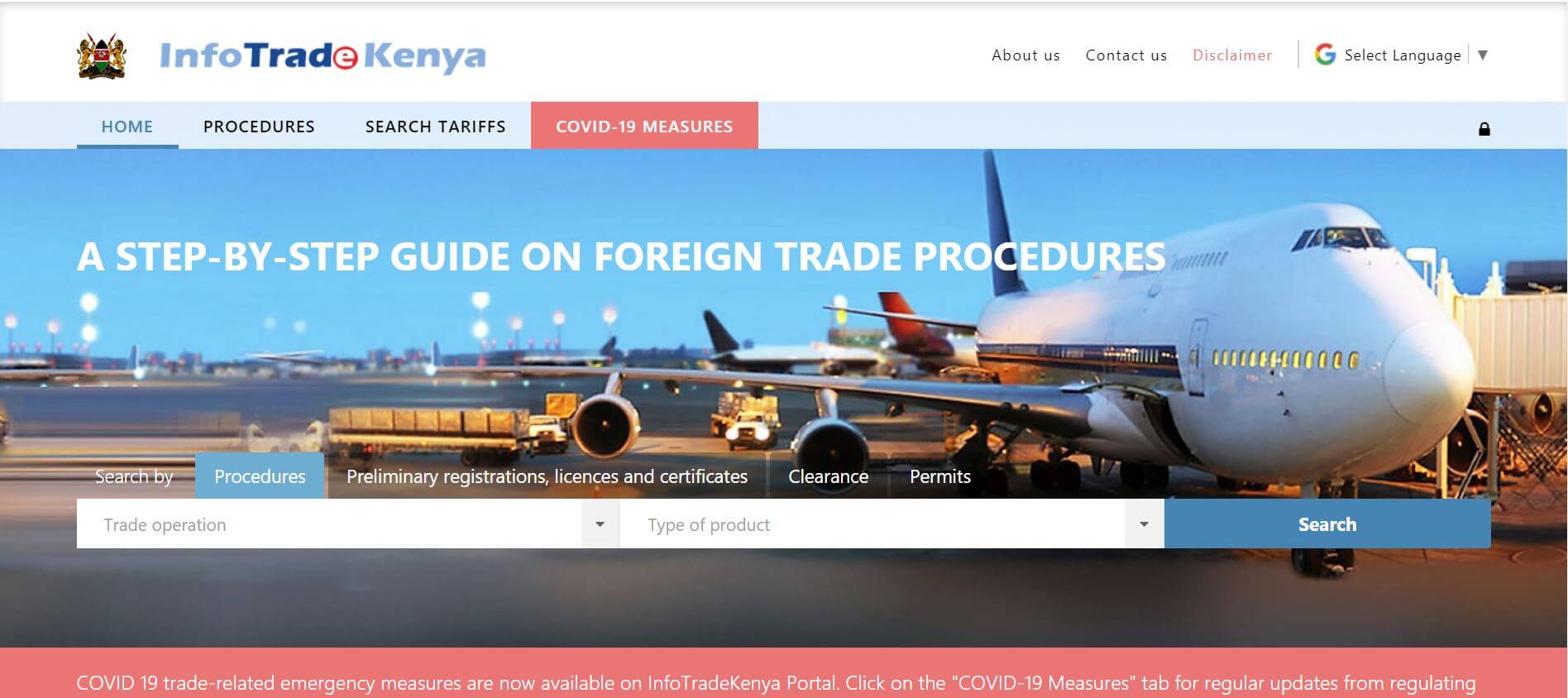Simplification works.
Exporters, and importers of fresh or dry produce to Kenya are required to register with Kenya Plant Health Inspectorate Service (KEPHIS). Until recently, this registration took between 10 to 28 days with the traders completing a total of 10 steps and filling in 13 documents. A time-consuming effort that was also costly. Simplification of processes by KEPHIS have reduced the number of steps by half – to 5- and requirement to submit only 3 documents, translating into a 62 % reduction of traders’ transactional costs
The Information for Trade in Kenya Portal (InfoTradeKE) serves as a one-stop shop for information on trade-related procedures, from various government directorates, and provides a step-by-step guide on foreign trade procedures from the user’s (exporter/importer) point of view. It was implemented by Kenya Trade Network Agency (KenTrade) in partnership with TradeMark Africa (TMA) through funding from United States Agency for International Development (USAID) and the Netherlands and with technical support from the United Nations Conference on Trade and Development (UNCTAD).
The Portal has approximately 10,000 visitors each month. It has proven to be an ideal tool for regulators to analyse interventions in the export and import chain, providing insights on bottlenecks and barriers to trade that need to be dealt with to make the trader’s experience more efficient. The results from the simplification of the procedure to register as an exporter of fresh and dry produce with the Kenya Plant Health Inspectorate Service (KEPHIS) provides a perfect illustration of the power of this approach.

Simplification of trade procedures involves the elimination of steps, redundancies, and duplication of requirements, by looking at the current procedure against the laws (Acts and Regulations) that govern it. Additionally, simplification critically analyses the administrative cost incurred by businesses while applying for certificates, licences and permits for export and import.
KEPHIS has the mandate of quality assurance of agricultural inputs and produce to prevent adverse effects on the economy, environment, and human health. Exporters or importers of fresh or dry produce are required to first register with KEPHIS. Prior to simplification, this registration process required one to complete a total of ten (10) steps and provide thirteen (13) required documents. The whole process took between ten (10) to twenty-eight (28) days; as outlined on the “Register with Kenya Plant Health Inspectorate Service (KEPHIS) – Original” procedure on the Portal. The figure i below represents the requirements before the simplification of processes.
Figure 1
Reducing the administrative burden cost by 62% without changing any laws
A series of simplification workshops conducted by National Trade Facilitation Committee (NTFC) and KenTrade analysed procedure documented on InfoTradeKenya and identified registration of exporters of fresh and dry produce as cumbersome and submitted short term and long-term proposals to KEPHIS. Following which, KEPHIS has since implemented the short-term proposals identified, which has resulted to the following: the steps have now been reduced to five (5) (from 10), mandatory requirements to just two (2) (down from 13), and the duration of the procedure is now at six (6) to fourteen (14) days; as outlined on the new (current) “Register with Kenya Plant Health Inspectorate Service (KEPHIS)” procedure on the Portal. Figure ii represents the requirements after simplification.
Figure 2
Further to the reduction of the required documents, KEPHIS has also implemented the proposed application form in the registration procedure; previously, traders were required to submit a cover letter addressed to the Managing Director, stating their intent to export, market of export, crop to export, among other details – which is complex to structure. Implementation of the form has drastically reduced the number of attachments to accompany the cover letter, as the required information is now outlined on the new application form.
Furthermore, KEPHIS management agreed that applications could be submitted by email. Previously, these had to be delivered in person to KEPHIS regional centres, which was costly for businesses.
Simplifying KEPHIS’ registration procedure has not only impacted the total number of steps involved in the export of coffee, tea, flowers, beans, peas, avocados, nuts and oil crops products, cotton, sisal etc., but has also significantly reduced the administrative burden cost incurred by businesses in the registration procedure from KES 40,197.35 (US$ 375.5) to KES 15, 287.29 (US$ 142.8) therefore saving each business wishing to trade any type of plant products a total of KES 24, 910.06 (US$232.7). This represents a cost reduction of 62%.
It is important to note that these significant simplification results were achieved without changing any law and regulation. The measures to simplify were implemented right away thanks to effective managerial oversight at KEPHIS and cooperation with KenTrade and the NTFC Secretariat.
KEPHIS is happy with the efforts made to simplify procedures as this has reduced repetitive tasks and streamlined registration. Further, availing the information through the Portal has led to less inquiries, walk- ins and call-ins by traders enabling KEPHIS to better focus on its core objective of ensuring phytosanitary control.
Supporting Safe Trade Post Covid19
The KenTrade InfoTrade Team and the NTFC Secretariat are currently liaising with the border regulating agencies to identify quick simplification measures that allow for business continuity while avoiding physical contact. For example, over the past few weeks, they have accelerated the Coffee and Tea Directorates and the Department of Veterinary Services’ adoptions of Mobile payment solutions (such as M-Pesa) making it possible for non-human contact payments of various fees relating to the exports permits and licenses issued by these authorities. Such improvements are relayed in real time on InfoTradeKenya and monitored through a Simplification Dashboard accessible to decision makers.
Simplification of trade processes within KEPHIS is only one of the various initiatives being undertaken across the region. TMA in partnership with East Africa Community (EAC) secretariat and UNCTAD are already scaling up efforts to simplify 43 other procedures to improve ease of doing business in Kenya. Similarly, such initiatives are being undertaken in Tanzania, Uganda, and Rwanda in partnership with respective governments. Each of these countries have also implemented similar Trade Information Portals with TMA, UNCTAD and EAC support. They can all be accessed via EAC’ regional tradehelpdesk: http://tradehelpdesk.eac.int/ providing traders with an easy single access to information related to imports or exports in the region.
Watch this video for a quick demo of how to use InfoTradeKenya LINK
[1] The Portal has incorporated an Administrative Burden Cost (ABC) module that helps calculate the hidden cost within procedures of obtaining licences, certificates, permits and clearing goods. The ABC module categorizes staff levels within an organization into three (3); Level 1 – assistants, drivers and clerks, level 2 – traders and officers, and level 3 – senior managers and Directors. Each level has a cost implication against their respective hourly wage, associated with the time taken by a staff member to complete a step.















